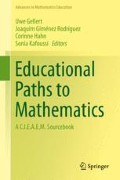Abstract
This chapter develops the concept of ‘deliberative dialogue’ to explore crucial characteristics of mathematics classroom practice, in which the promotion of social participation is an explicit aim. It presents two case studies: one on future teachers facing deliberate dialogues, another on on-line deliberate dialogue in a secondary school mathematics classroom. It concludes that more pre-service and in-service teachers should be involved in design-based research activities that seek to facilitate participation and deliberate dialogue in mathematics classrooms.
Access this chapter
Tax calculation will be finalised at checkout
Purchases are for personal use only
References
Alrø, H., & Skovsmose, O. (2002). Dialogue and learning in mathematics education: Intention, reflection and critique. Dordrecht: Kluwer.
Bairral, M. A., & Powell, A. B. (2013). Interlocution among problem solvers collaborating online: A case study with prospective teachers. Pro-Posiçöes, 24(1), 1–16.
Castells, M. (2012). Redes de indignación y esperanza. Los movimientos sociales en la era de Internet. Madrid: Alianza.
Cobb, P., Stephan, M., McClain, K., & Gravemeijer, K. (2001). Participating in classroom mathematical practices. The Journal of the Learning Sciences, 10(1&2), 113–163.
Dewey, J. (2008). Democracy and education: An educational classic. Radford: Wilder.
Englund, T. (2006). Deliberative communication: A pragmatist proposal. Journal of Curriculum Studies, 38(5), 503–520.
Englund, T. (2011). The potential of education for creating mutual trust: Schools as sites for deliberation. Educational Philosophy and Theory, 43(3), 236–249.
Giménez, J., Font, V., & Vanegas, Y. M. (2013). Designing professional tasks for didactical analysis as a research process. In C. Margolinas (Ed.), Proceedings of ICMI Study 22 “Task design in mathematics education” (pp. 581–590). Oxford: ICMI.
Gorgorió, N., Planas, N., & Vilella, X. (2000). The cultural conflict in the mathematics classroom: Overcoming its “invisibility”. In A. Ahmed, J. M. Kraemer, & H. Wiliams (Eds.), Cultural diversity in mathematics (education): CIEAEM 51 (pp. 179–185). Chichester: Horwood.
Gutmann, A., & Thompson, D. (1996). Democracy and disagreement. Cambridge, MA: Belknap.
Habermas, J. (1987). The theory of communicative action (Lifeworld and systems: A critique of functionalist reason, Vol. 2). Boston: Beacon.
Hammond, M. (1999). Issues associated with participation in on line forums: The case of the communicative learner. Education and Information Technologies, 4(4), 353–367.
Hammond, M., & Wiriyapinit, M. (2005). Learning through online discussion: A case of triangulation in research. Australasian Journal of Educational Technology, 21(3), 283–302.
Hudson, J. M., & Bruckman, A. S. (2004). The Bystander effect: A lens for understanding patterns of participation. The Journal of Learning Sciences, 13(2), 165–195.
Kennedy, N., & Kennedy, D. (2011). Community of philosophical inquiry as a discursive structure, and its role in school curriculum design. Journal of Philosophy of Education, 45(2), 265–283.
Krummheuer, G. (2007). Argumentation and participation in the primary mathematics classroom: Two episodes and related theoretical abductions. Journal of Mathematical Behavior, 26(1), 60–82.
Lave, J., & Wenger, E. (1991). Situated learning: Legitimate peripheral participation. New York: Cambridge University Press.
McCoy, M. L., & Scully, P. L. (2002). Deliberative dialogue to expand civic engagement: What kind of talk does democracy need? National Civic Review, 91(2), 120–128.
Pruitt, B., & Thomas, P. (2007). Democratic dialogue: A handbook for practitioners. Washington, DC: Trydells Tryckeri.
Salmon, G. (2004). E-moderating: The key to teaching and learning online (2nd ed.). London: Taylor & Francis.
Serradó, A. (2009). E-forum, a strategy for developing key competences of communication in, with and about mathematics. In L. Gómez Chova, D. Martí Belenguer, & I. Candel Torres (Eds.), Proceedings of the international conference and new learning technologies (EDULEARN) (pp. 1–12). Barcelona: IATED.
Serradó, A. (2012). How to question in an on-line forum to promote a democratic mathematical knowledge construction? International Journal for Mathematics in Education, 4, 369–374.
Skovsmose, O., & Valero, P. (2001). Breaking political neutrality: The critical engagement of mathematics education with democracy. In B. Atweh, H. Forgasz, & B. Nebres (Eds.), Socio-cultural aspects of mathematics education: An international research perspective (pp. 37–56). Mahwah: Lawrence Erlbaum.
Valero, P. (1999). Deliberative mathematics education for social democratization in Latin America. Zentralblatt für Didaktik der Mathematik, 31(1), 20–26.
Vanegas, Y. M. (2013). Competencias ciudadanas y desarrollo profesional en matemáticas. Unpublished PhD thesis, Universitat de Barcelona.
Vanegas, Y. M., & Giménez, J. (2012). What future mathematics teachers understand as democratical values. International Journal for Mathematics in Education, 4, 457–462.
Yankelovich, D. (1999). The magic of dialogue: Transforming conflict into cooperation. New York: Simon & Schuster.
Acknowledgements
The work presented was realized in the framework of the following Research Projects: (1) REDICE-10-1001-13 “A competencial perspective about the Master’s Training for Secondary School Mathematics Teachers”. (2) EDU2012-32644 “Development of a program by competencies in a initial training for Secondary School Mathematics”. It was supported by the Agrupació de Recerca en Ciències de l’Educació in 2013 and the Comissionat per a Universitats I Recerca del DIUE from Generalitat de Catalunya (GREAV 2014 SGR 485).
Author information
Authors and Affiliations
Corresponding author
Editor information
Editors and Affiliations
Rights and permissions
Copyright information
© 2015 Springer International Publishing Switzerland
About this chapter
Cite this chapter
Serradó, A., Vanegas, Y., Giménez Rodríguez, J. (2015). Facilitating Deliberate Dialogue in Mathematics Classroom. In: Gellert, U., Giménez Rodríguez, J., Hahn, C., Kafoussi, S. (eds) Educational Paths to Mathematics. Advances in Mathematics Education. Springer, Cham. https://doi.org/10.1007/978-3-319-15410-7_19
Download citation
DOI: https://doi.org/10.1007/978-3-319-15410-7_19
Publisher Name: Springer, Cham
Print ISBN: 978-3-319-15409-1
Online ISBN: 978-3-319-15410-7
eBook Packages: Humanities, Social Sciences and LawEducation (R0)

